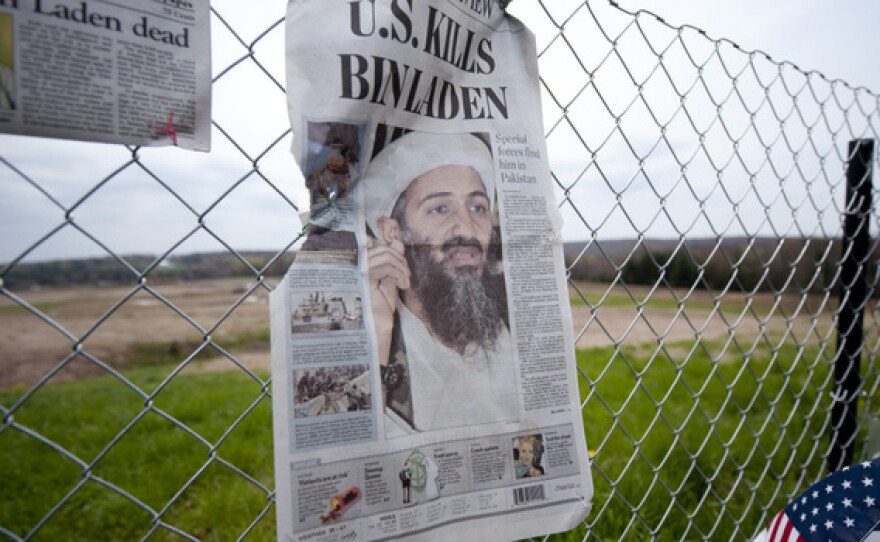Ten years after the terrorist attacks of Sept. 11, 2001, the United States is "undoubtedly safer and more secure," but gaps in coordination among the government agencies responsible for security remain a problem.
That's the conclusion reached by two highly influential analysts of American security, Thomas Kean and Lee Hamilton.
The co-chairmen of the 9/11 Commission have released a Tenth Anniversary Report Card in which they identify many areas of continuing concern. They include sometimes fragmented responses to more recent crises, unwieldy congressional oversight and lack of progress on creating secure driver's licenses and other official identification.
"With important 9/11 Commission recommendations ... still unfulfilled, we fail to achieve the security we could or should have," Kean and Hamilton conclude in their new report.
Measuring The Threat
With the death of Osama bin Laden and other al-Qaida leaders, some will question whether the terrorist organization remains as large a threat as it was back in 2001, says Rajan Menon, the chairman of the department of international relations at Lehigh University in Pennsylvania.
And, Menon notes, it would be impossible ever to achieve 100 percent security against terrorist groups in an open and democratic society with "extremely long borders" along both land and sea.
"Anyone who says they can offer you a 100 percent airtight defense against terrorist attacks is leading the country into a false sense of security," Menon says.
All Manner of Challenges
Still, governments at all levels can make it a lot harder for a terrorist attack to occur, he says.
And Hamilton and Kean aren't just addressing the risk of a fresh strike from al-Qaida. They use last year's oil spill in the Gulf of Mexico to illustrate both improvements and shortfalls in terms of how various government agencies worked together in response.
"The things they're recommending would increase security for America against all kinds of threats, not just al-Qaida," says Philip Zelikow, who served as executive director of the 9/11 Commission, which was formally known as the National Commission on Terrorist Attacks Upon the United States.
Improvements In The Air
The original 9/11 Commission's recommendations led to numerous new laws, including an attempt to gather intelligence efforts together by creating an Office of the Director of National Intelligence (DNI).
Not everything has gone according to plan, however. Kean, a former Republican governor of New Jersey, and Hamilton, a former Democratic representative from Indiana, note that four different directors of national intelligence over the past six years have struggled to "advance a unified effort across the intelligence community."
They point out that there has been some progress on this front and that intelligence spending has doubled over the past decade, to $80 billion annually.
They applaud the shift in responsibility for checking airline passengers on the "no fly" and "automatic selectee" watch lists. Previously that was done by private airlines, and now it's done by the Transportation Security Administration (TSA). But they say bags are not being screened as rigorously as necessary for explosives.
In general, aviation security is much improved and continues to follow positive trends, says counterterrorism expert Richard Bloom of Embry-Riddle Aeronautical University in Arizona.
TSA officials are doing a better job of marrying information about vulnerabilities in the system. This would include potential bomb attacks at an airport, or assessing current threats, which require the ability to identify individuals who pose the greatest risk at any given moment.
Thanks to these efforts and improvements in data collection and analysis, Bloom says, the day may come when the TSA and other security agencies are able to focus their efforts on smaller and smaller subsets of the population. "Not everyone will have to take off their shoes, and that kind of thing," he says.
Ongoing Vigilance
But that's in the future. Vigilance remains important, but it's unclear whether the latest update from Kean and Hamilton will make anything like the splash on Capitol Hill that their original report made back in 2004.
They have not kept intact the members of their original commission, but have assembled a group of individuals with broad government experience to keep an eye on security issues under the auspices of the Bipartisan Policy Center.
"Kean and Hamilton are continuing to make their recommendations, and I know people on Capitol Hill pay attention to this," says Zelikow, a historian at the University of Virginia.
There is also the broader question about how much Congress and the country are willing to continue to invest in homeland security.
The widespread commemoration of the 2001 attacks may lead to a renewed level of concern, but there may also be a greater feeling of complacency in the wake of bin Laden's death.
Menon, the Lehigh professor, says the vast ramping up of the government's security apparatus was an understandable response to the "unprecedented" scale of the Sept. 11 attacks.
But he cautions that the threat posed to American national security by al-Qaida has "probably been hyped beyond a level to which it should be. My conclusion is that terrorism in America is like terrorism in any country that faces it. You try to manage it to varying degrees."





